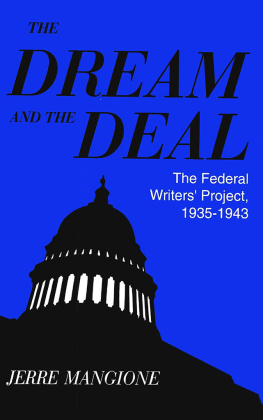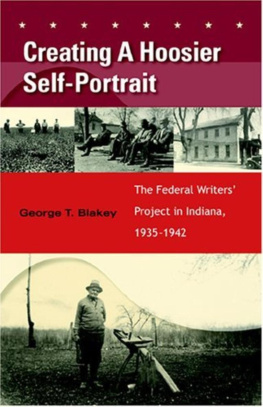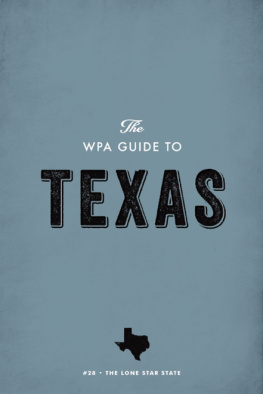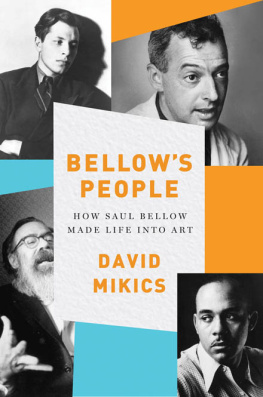THE DREAM
AND THE DEAL
THE DREAM
AND THE DEAL
The Federal Writers' Project 19351943

Jerre Mangione

SYRACUSE UNIVERSITY PRESS
Copyright 1996 by Syracuse University Press
Syracuse, New York 13244-5160
All Rights Reserved
First Syracuse University Press Edition 1996
96 97 98 99 00 01 6 5 4 3 2 1
Originally published in 1972 by Little, Brown and Company.
The author is grateful for permission to quote from the following sources: "The Inquiry" by Weldon Kees from The Collected Poems of Weldon Kees edited by Donald Justice. Copyright 1943 by Weldon Kees. Copyright 1960 by John A. Kees. First published in Poetry in July, 1938. Reprinted by permission by Poetry and the University of Nebraska Press; Orphans in Gethsemane by Vardis Fisher. Copyright 1960 by Vardis Fisher. Reprinted by permission of Mrs. Vardis Fisher; "Thinking of Russia" by H. H. Lewis is reprinted by permission of B. C. Hagglund, publisher of the pamphlet, Thinking of Russia, in 1931; "The Liberal" by H. H. Lewis first appeared in Jack Conroy's magazine, Rebel Poet, published in October-December, 1931. It is reprinted here by permission of Mr. Conroy.
Library of Congress Cataloging-in-Publication Data
Mangione, Jerre Gerlando, 1909
The dream and the deal : the Federal Writers' Project, 19351943 / by Jerre Mangione.
p. cm.
Originally published: Little, Brown, cl972.
Includes bibliographical references (p. ) and index.
"Selected publications of the WPA Federal Writers' Project and the Writers' Program": p.
ISBN 0-8156-0415-7 (pbk. : alk. paper)
1. Federal Writers' ProjectHistory. 2. Writers' Program (U.S.)History. I. Title.
E175.4.W9M3 1996
973.917dc20
96-31893
Manufactured in the United States of America
For all my friends, dead and alive, who were part of the Federal Writers' Project
Acknowledgments
This book tells for the first time the comprehensive story of an extraordinary governmental enterprise the Federal Writers' Project (1935-1943). for a list of their names), and corresponded with others. The extent to which this book succeeds in recapturing the atmosphere and drama of the Project experience should be largely attributed to the information and impressions transmitted to me by these men and women.
It was my good fortune to reach in time two men, now dead, who were key figures in the Project's history: Henry G. Alsberg, the Project's national director until 1939, on whose staff I served; and Vardis Fisher, the novelist, who directed the Writers' Project in Idaho. Alsberg died in November 1970, at the age of eighty-nine; Fisher, age seventy-three, died in July 1968, barely a month after I had interviewed him in Boise, Idaho. Unfortunately, some of the others who had played major roles in the Project story (Jacob Baker, George W. Cronyn, Joseph Gaer, Clair Laning, John Newsom, Lyle Saxon, and Richard Wright, among others) were either dead or on the verge of death by the time I began gathering material for this book.
As for the survivors, I am deeply indebted to Dora Thea Hettwer of New York City, a member of the Project's Central Office from its first day to the last, who was Alsberg's executive secretary through most of his directorship. Miss Hettwer was able to provide me with many valuable records, and with personal reminiscences that helped to revive my own memories of the Project. I also owe special thanks to Katharine Kellock, the Project's tours editor, for permission to quote from her personal papers in the Library of Congress, and for helping me locate some of the basic data for this work.
Other former members of the Project who supplied me with useful records were Benjamin A. Botkin of Croton-on-Hudson, N.Y.; Jack Conroy of Moberly, Mo.; Stella B. Hanau of New York City; Reed Harris of Washington, D.C.; Marion Knoblauch Franc of Chicago; Bert James Loewenberg of Bronxville, N.Y.; Carl Malmberg of Warner, N.H.; Lisle Reese of Winter Park, Fla.; Ellen Tarry of New York City; Donald Thompson of New York City; Rudolph Umland of Prairie City, Kans.; Charles van Ravenswaay of Winterthur, Del.
The following ex-Project members were also especially helpful: Jack Balch, the late Josef Berger (Jeremiah Digges), Sterling A. Brown, John Cheever, Earl Conrad, Paul Corey, Miriam Allen deFord, Leon (Bill) Dorais, Ralph Ellison, Lawrence Estavan, Mary Lloyd, James McGraw, Vincent McHugh, Lawrence Morris, Harold Rosenberg, Harry Roskolenko, Morton W. Royse, and George F. Willison.
I also wish to express gratitude for illuminating letters that arrived during the years 19671970 from these former members of the Project: Conrad Aiken, Nelson Algren, Allan Angoff, Saul Bellow, Howard McKinley Corning, Harold Coy, Alexander Crosby, Edward Dahlberg, Billie S. Jensen, Leon Srabian Herald, Norman Macleod, Frank Mead, George McMillan, Sam Ross, Arthur M. Saxe, Basil Vaerlen, Marguerite Yancey. A number of friends who were not members of the Project were able to add to my knowledge of it, among them Daniel Aaron, Benjamin Appel, Whitfield Bell, Millen Brand, Nina Collier, Julius Davidson, Arthur and Elizabeth Goldschmidt, the late Josephine Herbst, Alfred Kazin, James Michener, Harvey O'Connor, Evanell Powell, Richard Powell.
By correspondence or interview, I obtained indispensable information about the Project's activities around the country from sixteen men and women who had once served as Project state directors: Ray A. Billington, Carita D. Corse, the late Vardis Fisher, John T. Frederick, Irene Fuhlbruegge, J. Harris Gable, Muriel E. Hawks, Dorris Westall Isaacson,Curtis D. MacDougall, Harold G. Merriam, Dale Morgan, Ethel Schlasinger Overby, Lisle Reese, Harry Shaw, Charles van Ravenswaay, Agnes Wright Spring.
Elsewhere in this book is a listing of the sources I consulted. Here I would like to single out four secondary sources that I found particularly valuable: Daniel Aaron's Writers on the Left, which helped me understand more fully the effect of the Depression on the political attitudes of American writers; William F. McDonald's Federal Relief Administration and the Arts, which provided me with essential information about the origins and operations of the Writers' Project; and two Ph.D. theses, Kathleen O'Connor McKinzie's "Writers on Relief, 1935-1942," which helped me unsnarl the knotty adventures of the New York City Writers' Project; and Ronald Warren Taber's "The Federal Writers' Project in the Pacific Northwest: A Case Study," which added significantly to my knowledge of how the Project operated in the states of Washington, Oregon and Idaho.
My research efforts were made easier by the kindness and diligence of librarians and archivists in Philadelphia, Washington, D.C., Chicago, New York City, Berkeley, San Francisco, Denver, Lincoln (Nebraska), Salt Lake City, Columbia (Missouri), Boston, and Seattle. My thanks to the manuscript division of the University of Washington library for permitting me to examine correspondence in the Mary Farquharson Collection. I am grateful to Robert Kvasnicka and his staff at the National Archives, and to Linda Kosmin of Drexel University, whose generous bibliographical assistance lightened my labors considerably. Special thanks are due to Arthur Scharf of Pittsburgh, who compiled the checklist of selected Project books and pamphlets that supplements my history; and who loaned me his scrapbook containing book reviews of the major Project publications.
Next page






